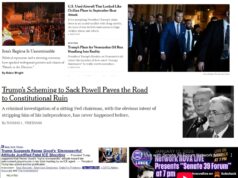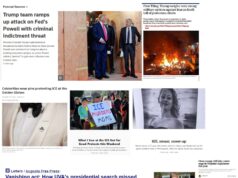This piece has lately run in newspapers in my very red congressional district (VA-06).
***********************
Back during the 2016 campaign, Donald Trump himself seemed genuinely surprised by the nature of his support when he memorably said, “I could stand in the middle of Fifth Avenue and shoot somebody and I wouldn’t lose any voters.” He seems to have been right in making that claim.
Trump has shown himself to be extraordinarily gifted in forging a certain kind of bond of unquestioned loyalty among at least some in the Republican base. And we can look for evidence of that extraordinary kind of loyalty at some recent primaries in which Republican politicians who’d voiced criticisms of Trump — such as, most prominently, Republican Congresswoman Martha Roby of Alabama — were punished by a sizeable portion of the Republican primary electorate.
A four-term incumbent, Rep. Roby nonetheless failed to reach the 50% of the Republican primary vote required to avoid a run-off. This failure was generally interpreted as demonstrating that a portion of the Republican base was punishing Roby for saying, after the Access Hollywood tape went public two years ago: “I cannot look my children in the eye and justify a vote for a man who promotes and boasts about sexually assaulting women.”
It seems a ferocious kind of loyalty that would lead a sizeable cadre of Trump supporters to refuse to forgive — even after two years — a conservative Republican congresswoman for criticizing Trump on the basis of long-established conservative (and Christian) moral values. So fiercely loyal that anything against Trump is unforgiveable.
When followers cannot forgive any criticism of the leader, whereas nothing the leader might do (shoot someone on 5th Avenue) could diminish their support, that signifies what the student of history recognizes as a “cult of personality.”
How much of Trump’s support has this cult-like tendency? Apparently, judging from the primary results, it is not a majority of the Republican base. But it’s a large enough minority to sway some Republican primary elections (such as, to cite another example, Mark Sanford’s loss in South Carolina).
But another cultish quality seems to be much more widespread: i.e. that anything the leader says will be believed, no matter how clearly false.
It used to be that Republicans were notably hawkish in opposing Russia, for example. But because the leader has spoken favorably about the Russian dictator, Vladimir Putin, and is critical of former American President Obama, polls show that more than four times as many Republicans think well of Putin than of Obama.
On the immigration issue, Republicans evidently believe the lie that the nation is being flooded by undocumented aliens, even though the numbers crossing the border have actually been much lower in recent years than before. They’ve also bought the lie that these immigrants are the source of some supposed crime wave — whereas in fact, not only is our national crime rate these years at lows not seen in many decades, but these immigrants commit crimes at a lower rate than native-born Americans.
Trump’s success in creating such a “cult of personality” is an achievement whose impressiveness is suggested by how unique such a relationship of loyalty and credulity may be in the history of American leaders.
An impressive achievement, but not one we should welcome: History has shown quite clearly how dangerous it can be for both the followers and the nation when such a cult arises around a leader wielding great power.
We can see that danger in the fact that 75% of Republicans believe the obvious lie that the Mueller investigation is a “witch hunt.” That cultish credulity threatens to make the emerging constitutional crisis – the coming historic collision — unnecessarily dangerous.
The central truth of this American moment is that a battle is being fought between a force made up of all those parts of America who have rallied to protect the American constitutional order, and a very different force – of which Trump is part – that is working turn the nation from the kind founders intended –where the law can serve as a check on the powerful — into one where the law is an instrument the powerful can wield to maintain their power.
One way Trump is fighting this battle is by preparing the members of his credulous cult to dismiss what law enforcement – such as outstanding Republicans like Special Prosecutor Robert Mueller, Assistant Attorney General Rod Rosenstein, and FBI Director Chris Wray – eventually report to the nation. Trump hopes that his followers, buying the “witch hunt” lie, will think: “No need to pay attention to the evidence, when I already know it’s just a frame-up by enemies of Trump using American law enforcement to bring him down.”
The danger this poses to the nation is clear in view of how often Trump has already shown that he has no compunctions about damaging the nation in order to protect himself:
Under normal American conditions, only a crazy fringe would not be persuaded of the validity of the investigation’s (predictably damning) conclusions. But if too many people will believe anything a leader of Trump’s character tells them, America could fracture into two impassioned and opposing groups: those devoted to America (and accepting of the truth) and those devoted to Trump (and blindly believing the lie).
One American Civil War was already one too many.


![[UPDATED 1/29/26] Audio: Sen. Tim Kaine Talks to Blue Virginia About His “Five-Point Plan” to Fight Trump’s Orban-Like Assault on US Democracy; Civil Disobedience a la MLK Jr.; Trump’s Bogus “Energy Emergency”; the Crucial Importance of the 2025 VA Elections; etc.](https://bluevirginia.us/wp-content/uploads/2025/02/kaineinterview2-238x178.jpg)






![[UPDATED 1/29/26] Audio: Sen. Tim Kaine Talks to Blue Virginia About His “Five-Point Plan” to Fight Trump’s Orban-Like Assault on US Democracy; Civil Disobedience a la MLK Jr.; Trump’s Bogus “Energy Emergency”; the Crucial Importance of the 2025 VA Elections; etc.](https://bluevirginia.us/wp-content/uploads/2025/02/kaineinterview2-100x75.jpg)

